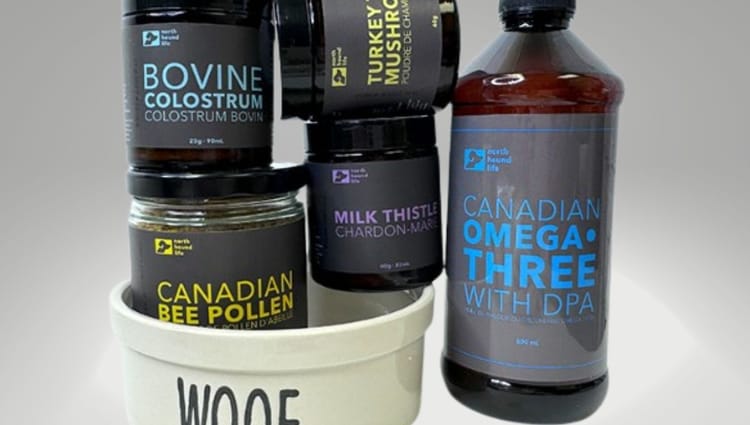Unleash the Power of Green: Spirulina, the Superfood Tailored for Paws!

Spirulina is a nutrient-rich superfood that has gained popularity in the health and wellness community. But did you know that it can also provide numerous benefits for our furry friends? That's right, Spirulina is not only beneficial for humans but can also have positive effects on dogs. In this blog post, we will explore the potential benefits of Spirulina for dogs, its nutritional value, and how to incorporate it into your dog's diet safely.
Firstly, let's talk about what Spirulina ac. Spirulina is a blue-green algae that grows in freshwater lakes and ponds. It is packed with essential nutrients, including protein, vitamins, minerals, and antioxidants. This nutrient-dense profile makes Spirulina a promising dietary supplement for dogs.
One of the key benefits of Spirulina for dogs is its ability to promote healthy coat and skin. Spirulina contains omega-3 fatty acids and other essential fatty acids that can help reduce inflammation and improve the overall condition of your dog's skin and coat. Regular supplementation of Spirulina may lead to a shinier coat, reduced itchiness, and better overall skin health.
In addition to its effects on coat and skin, Spirulina can also support your dog's immune system. Spirulina is rich in antioxidants, such as beta-carotene and phycocyanin, which can help neutralize free radicals and protect cells from oxidative damage. A strong immune system is crucial for your dog's overall health and can help fight off infections and diseases.
Furthermore, Spirulina is known to provide a natural energy boost. The high protein content in Spirulina can help support muscle growth and repair, leading to increased energy levels and vitality in dogs. This can be particularly beneficial for active or working dogs who require optimal performance and endurance.
Now that we know some of the potential benefits of Spirulina for dogs, let's discuss how to incorporate it into their diet. Spirulina is available in powder or tablet form, making it easy to administer to your furry friend. It is recommended to start with a small dosage and gradually increase it to the appropriate level for your dog's size and weight. The general recommended dosage is 1 gram per day for every 10 pounds of body weight.
When introducing Spirulina to your dog's diet, it is essential to consult with your veterinarian. They can provide tailored advice based on your dog's specific needs and health condition.
While Spirulina is generally safe for dogs, it's important to be aware of potential side effects. Some dogs may experience digestive upset, such as diarrhea or gas, when first starting Spirulina supplementation. If you notice any adverse reactions, it's best to discontinue use and consult your veterinarian.
In conclusion, Spirulina can offer numerous benefits for dogs, including improved coat and skin health, enhanced immune system support, and increased energy levels. Its nutrient-dense profile makes it a valuable dietary supplement for our furry friends.
However, always consult with your veterinarian before introducing any new supplements to your dog's diet. They can provide personalized guidance and ensure that Spirulina is safe and suitable for your dog.
Unleash the Power of Spirulina: The Ultimate Superfood for Dogs

Best For Nutritional Boost
Spirulina
Give your furry friend the ultimate nutritional boost with spirulina, Mother Nature's original superfood. Packed with vitamins, minerals, and essential amino acids, spirulina is a game-changer for your dog's health.
Say goodbye to free radicals and hello to a healthier pup! Spirulina is a powerhouse of antioxidants that combat oxidative stress, inflammation, and aging. By neutralizing harmful free radicals, spirulina promotes overall wellness in your furry companion.
Give your dog's immune system a boost with spirulina. Its unique compounds, like phycocyanin, enhance immune function, helping your pup stay strong and recover faster from illnesses.
Detoxify your dog's body naturally with spirulina. This incredible superfood binds to heavy metals and toxins, assisting in their removal and supporting a cleaner, healthier system.
Protect your dog from chronic inflammation and its associated risks. Spirulina's anti-inflammatory properties reduce the chances of health issues caused by inflammation, ensuring your furry friend stays happy and healthy.
Experience the difference in your dog's skin and coat with spirulina. Loaded with essential fatty acids and nutrients, spirulina promotes a shinier coat and healthier skin, making your pup the envy of the dog park.
Give your dog the ultimate nutritional powerhouse. Unleash the power of spirulina and see the incredible benefits for yourself. Your furry friend will thank you!
Sources:
- "Supplementation of Diets With Spirulina Influences Immune and Gut Function in Dogs" - Frontiers in Nutrition
- "Oral Palatability and Owners' Perception of the Effect of Increasing Amounts of Spirulina (Arthrospira platensis) in the Diet of a Cohort of Healthy Dogs" - MDPI
- "Would my dog or cat benefit from spirulina?" - Bestie Health
- "ARTHROSPIRA-NUTRITIONAL VALUE, HEALTH-PROMOTING PROPERTIES AND POSSIBLE USE AS AN ADDITIVE IN DOG NUTRITION. A REVIEW." - Ebscohost
- "Benefits of super food and functional food for companion animals" - Google Books
- "Microalgae in pet foods" - ScienceDirect
- "Iron Bioaccessibility and Speciation in Microalgae Used as a Dog Nutrition Supplement" - MDPI
- "Effect of dietary supplementation of Spirulina (Arthrospira platensis) and Thyme (Thymus vulgaris) on growth performance, apparent digestibility and health status of dogs" - ScienceDirect
- "Effects of microalgae as dietary supplement on palatability, digestibility, fecal metabolites, and microbiota in healthy dogs" - PubMed Central
- "Sled dogs as a model for PM2. 5 exposure from wildfires in Alaska" - ScienceDirect





